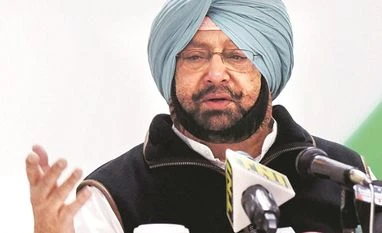Punjab Chief Minister Amarinder Singh on Monday appealed to Prime Minister Narendra Modi to reconsider the decision to promulgate three Ordinances on the farm sector, saying these will lead to "exploitation" of farmers by organised trade and further "exacerbate the socio-economic tensions" among the state's peasantry.
The chief minister expressed his reservation about the laws -- the Farmers' Produce Trade and Commerce (Promotion and Facilitation) Ordinance, the Farmers' Produce Trade and Commerce (Promotion and Facilitation) Ordinance, and the Essential Commodities (Amendment) Ordinance -- that the Centre has said will transform the farm sector and help raise farmers' income.
In a letter to the prime minister, Singh sought a reconsideration of the three ordinances on permitting trade in agricultural produce outside the physical boundaries of the set-up of the agricultural market under the APMC Act, easing restrictions under the Essential Commodities Act, and facilitating contract farming.
All three should be revisited keeping in view the concerns and the interests of the farmers, said Singh.
Punjab has been at the forefront of ensuring food security for the country, he said.
The development of crop production technology for wheat and paddy as well as its dissemination, supported by the assured procurement at minimum support price (MSP) in the notified markets, has played a key role in building up buffer stocks and making the country self-reliant, he stressed.
The results of this policy were most visible in the recent past when the country was able to face the unprecedented crisis emanating from the Covid-19 pandemic with confidence, with no threat of hunger and food deprivation, he said.
Referring to the Ordinances, the chief minister said the Agriculture Produce Marketing Committee (APMC) system in Punjab had stood the test of time and served the state and the country well over the last 60 years.
However, the Ordinances have led to widespread apprehension among the farmers of the state that the central government was planning to withdraw from the assured procurement of food grains produced by them.
He said that there was also another apprehension that the proposed barrier-free nationwide markets for farmers would really come to mean a nationwide market for traders, possibly to the detriment of the already debt-ridden and beleaguered farmers of the state.
The Ordinances at the times of the unprecedented pandemic will further exacerbate the socio-economic tensions among the farmers of the state, the chief minister said, adding that this would not at all be conducive for the peace and development of the region, which faces serious challenges of public order due to a "live" international border.
Drawing the prime minister's attention to The Farmers' Produce Trade and Commerce (Promotion and Facilitation) Ordinance, 2020, Singh said it permits new marketing channels outside the APMC domain and has, thus, far-reaching implications for the states, particularly Punjab.
He asserted that Punjab had already amended its APMC Act, 1961 to provide for a single unified licence and setting up of private market yards for direct purchase from farmers.
The chief minister wrote that leaving farmers, who neither could hold their produce for a long time after harvest nor had the bargaining power to fetch remunerative prices, at the mercy of organised trade will only increase the possibility of their exploitation by the traders.
On the easing of regulation of food grains under the Essential Commodities Act, Singh said it further allows the exporters, processors or traders to hold large stocks of farm produce without limits, except in certain grave situations of war, natural calamity, etc.
The amendment would allow the private players to buy the produce in harvest season, when prices are generally lower, and release it later when prices firm up. He stated that in the absence of any regulation, states would also have no information about the availability of stocks of commodities within the state.
Unlock 30+ premium stories daily hand-picked by our editors, across devices on browser and app.
Pick your 5 favourite companies, get a daily email with all news updates on them.
Full access to our intuitive epaper - clip, save, share articles from any device; newspaper archives from 2006.
Preferential invites to Business Standard events.
Curated newsletters on markets, personal finance, policy & politics, start-ups, technology, and more.
)